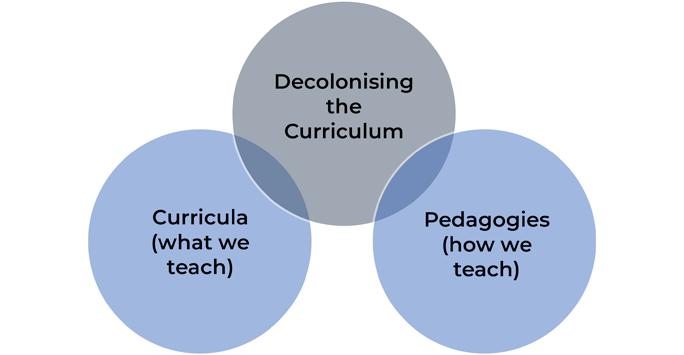Benefits
By decolonising the curriculum, students:
- Uncover unconscious biases. Students’ intellectual vision broadens to include diverse ethnic, racial, social and cultural perspectives.
- Broaden their knowledge production landscape. Reading lists across subjects are often made of white male authors. This perpetuates the perception that only certain groups are ‘able’ or ‘allowed’ to create and distribute knowledge.
- Become prepared to face an increasingly diverse world. UK’s population is projected to continue to ethnically diversify in the next years (Lomax, Wohland, Rees, & Norman, 2019).
Putting it into practice
- Explore Critical Race Theory. Expose the way in which racial inequality is perpetuated through ‘normal’ or everyday structures in society and in your subject. See Rollock & Gillborn (2011).
- Audit readings lists. Map the geopolitics of academic publication (Canagarajah, 2002) and consult a wider range of source materials, especially sources from the global south (Collyey, 2018).
- Involve students in decision making. Survey the content students would like to study and make space in your module to teach these topics.
- Do language learning. Engage students with language learning as a means of decolonisation of Eurocentric approaches (Rettová, 2017).
- Include diverse guest speakers. Go the extra mile and contact speakers who represent the diversity of the student cohort.
- Identify ‘diverse’ learning spaces. Choose venues named after diverse people who have contributed to the advancement of knowledge in your field and bring this to students' attention.
- Question, question, question. SOAS University of London has created a great questioning toolkit:

Curricula (what we teach)
- What is the demographic profile of authors on the syllabus / programme?
- What is the effect of this on the diversity of views with which the students are presented?
- To what extent does the programme design and delivery enable, encourage or require students to study non-European languages?
- Do programmes / modules enable the use of non-English sources in the curriculum?
Pedagogies (how we teach)
- Is my/our pedagogy transparent in terms of a) what students are expected to learn, b) how they are expected to learn it and demonstrate their learning, and c) how it is assessed?
- Does assessment clearly match the learning outcomes and the skills taught by the course
- Is there an opportunity to negotiate assessment methods with the students?
- Do the dynamics of the lecture / seminar / tutorial / office hours help to engage students who have been discouraged to actively participate or take risks in academic work as a result of structural and interpersonal racism?
Considerations and challenges
- Make a conscious decision to change. Decolonising your curriculum and pedagogy requires time and commitment to make it a priority. There are things you just can’t change (e.g. mathematical functions or recent developments) and others you can (e.g. source materials).
- It will be uncomfortable. Confronting racial inequality issues that may arise around your subject can be distressing. Plan and establish a safe environment for discussion with students and colleagues (Arao and Clemens, 2013).
- Level the field for non-traditional academic backgrounds. One’s entitlement to be where we are can often be taken for granted. Teach students to be fluent and confident in their academic environment by designing for different ways to deliver content and to assess.
References
Arao, B., & Clemens, K. (2013). From safe spaces to brave spaces. The Art of Effective Facilitation: Reflections from Social Justice Educators, pp. 135-150.
Canagarajah, A. S. (2002). A Geopolitics of Academic Writing. University of Pittsburgh Press.
Collyer, F. M. (2018). Global patterns in the publishing of academic knowledge: Global North, global South. Current Sociology, 66(1), 56-73.
Lomax, N., Wohland, P., Rees, P., & Norman, P. (2019). The impacts of international migration on the UK’s ethnic populations. Journal of Ethnic and Migration Studies, 1-23.
Rettová, A. (20017). Decolonization through language. LTC: Learning and Teaching Conference 10 May 2017. Last accessed 24 June 2020.
Rollock, N. and Gillborn, D. (2011) Critical Race Theory (CRT), British Educational Research Association online resource. Last accessed 24 June 2020.
SOAS University of London. Learning and Teaching Toolkit for Programme and Module Convenors. Last accessed 24 June 2020.
Help and Feedback
Can you help us improve this resource or suggest a future one? Do you need this resource in an alternative format? Please contact us at cie@liverpool.ac.uk

Decolonising the Curriculum by Dr Monica Chavez Munoz is licensed under a Creative Commons Attribution-NonCommercial 4.0 International License.
